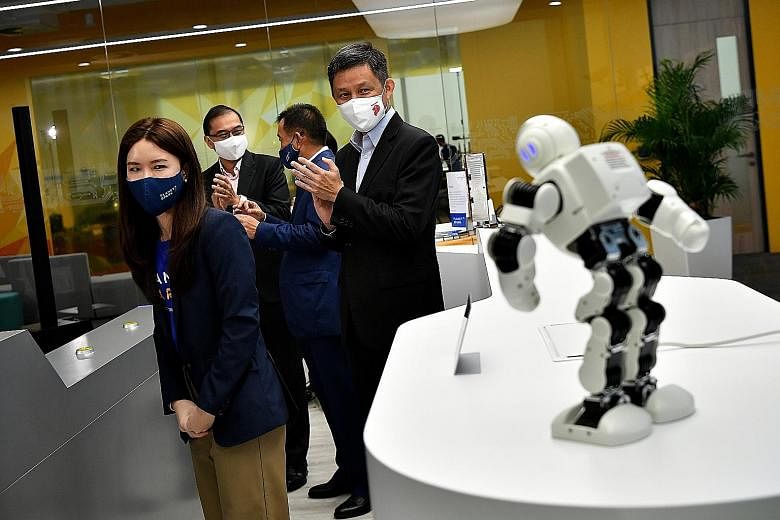Companies here must continue to innovate for Singapore to successfully capture new economic opportunities in electronics and manufacturing created by advances in technology such as artificial intelligence (AI) and the Internet of Things (IoT).
Making this call yesterday, Trade and Industry Minister Chan Chun Sing encouraged companies involved in the distribution of electronic components and in wholesale trade to "chart new paths of growth through innovation".
He said: "We also need our local hardware technology start-ups to continually innovate and develop new technologies, participate in (Singapore's) growth and improve the resilience of our manufacturing sector."
Speaking at the official launch of the PlanetSpark Innovation Centre in Changi Business Park, Mr Chan cited two emerging global trends that companies can take advantage of: the transformation of the electronics and advanced manufacturing sectors, and the growing need to improve the resilience of supply chains.
On the first trend, he noted that the Covid-19 pandemic has accelerated efforts to digitalise and this will continue as companies seek to overcome a shortage of manpower and minimise supply chain disruptions in the future. As a result, there is a growing demand for innovation in hardware.
This comes as the Government remains optimistic about the electronics distribution industry despite Covid-19, with Singapore exporting US$84 billion (S$112 billion) worth of electronic components, or about 10 per cent of global electronics exports, in 2019.
Such components include semiconductors and storage and memory products.
The manufacturing industry is also undergoing transformation and this is being driven by AI, IoT and large amounts of computational power, said Mr Chan.
For one thing, the global IoT sector, in which objects collect and exchange data to help people make decisions, is set to grow to US$1.6 trillion by 2025, from US$151 billion in 2018.
"The competitiveness of our electronics and manufacturing sector will depend on the speed at which we can innovate our products and production systems with technologies such as AI and IoT," said Mr Chan.
Another trend Singapore has identified is the need to improve the resilience of the goods supply chain to keep trade links open.
The pandemic has disrupted Singapore's supply chains, which was made worse by export restrictions imposed by other countries.
As a result, it is becoming more important for manufacturing companies all over the world to be resilient as they rethink their supply chains, said Mr Chan.
For instance, in the semiconductors space, there has been a stronger impetus for the reshoring, regionalisation and diversification of production bases and supply chains due to geopolitical tensions.
South-east Asia and Singapore are in a good position to capture a part of this reconfiguration of supply chains, said Mr Chan, but Singapore must demonstrate its ability to keep pace with innovations and remain competitive to do so.
He added that innovations from efforts such as the PlanetSpark Innovation Centre can, in the longer term, augment Singapore's technology capabilities and be marketed overseas. The centre helps local tech start-ups speed up deployment of their AI and IoT products and solutions in the market.
To entrench Singapore in the global value chain, companies will need their own intellectual property and solutions, as well as make use of technology, to provide value-added services and innovative products "that will distinguish our manufacturing sector, for both production and distribution", said Mr Chan.


